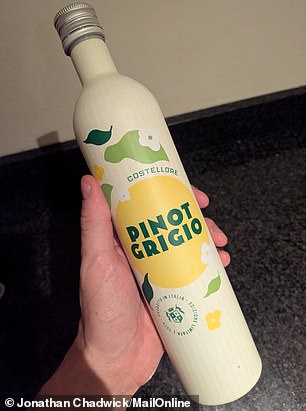
Can Aluminum Wine Bottles Slash Carbon Footprint? MailOnline Tastes Pinot Grigio vs. Glass
Aldi Launches UK’s First Aluminum Wine Bottle to Cut Carbon Emissions
Retail giant Aldi is rolling out an innovative eco-friendly alternative for wine lovers: aluminum bottles. Priced at £5.99, the 750ml Costellore Pinot Grigio claims to be the UK’s first supermarket own-label wine in aluminum, aiming to reduce carbon footprints.
Why Aluminum?
The aluminum bottle weighs 95g—75% lighter than glass—reducing transport emissions due to lighter shipments. Its opaque design also protects wine from sunlight, which can spoil flavor. Aldi emphasizes durability, noting it’s less likely to shatter if dropped.
[Image: Aluminum vs. glass bottle comparison]
Taste Test: Metal vs. Glass
To address concerns about metallic taste, MailOnline conducted a blind test. Two glasses were poured—one from aluminum, the other from glass. A volunteer incorrectly guessed which was which, while the author also failed to detect differences, debunking fears of a metallic tang.
[Image: Blind taste test in progress]
Sustainability Focus
Julie Ashfield, Aldi UK’s chief commercial officer, stated the move aligns with customer demand for greener choices. The wine is sourced from Italy and bottled in a UK facility using sustainable energy. Aluminum’s infinite recyclability further boosts its eco-credentials.
Potential Drawbacks
The tall, slim design resembles a deodorant canister, which may deter traditionalists. However, Aldi’s partnership with packaging firm Broadland Drinks ensures functionality without compromising taste.
[Image: Aluminum bottle alongside seafood meal]
Broader Climate Efforts
While aluminum bottles help, dietary changes—like reducing meat intake—have greater emission-cutting potential. A recent study highlighted simple food swaps (e.g., porridge over chocolate cereal) could slash personal carbon footprints by 71%.
[Image: Sustainable food swap examples]
Verdict
Aldi’s aluminum bottle offers a practical, planet-friendly alternative for casual wine drinkers. Though the unconventional look may take getting used to, its environmental benefits and unchanged taste make it a promising step toward sustainable consumption.
Final word: For eco-conscious shoppers, this innovation proves small swaps can contribute to larger climate goals—one sip at a time.


